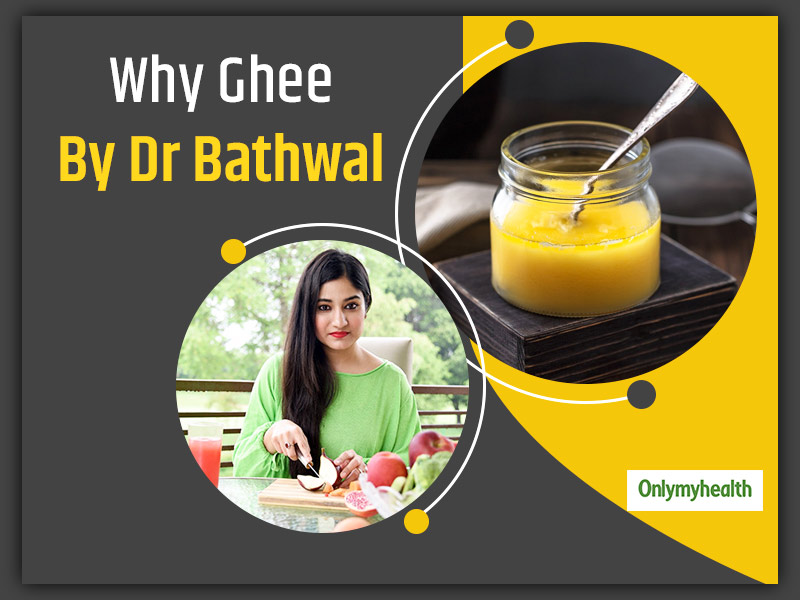
Ghee is one of the best substances for nourishing the body, strengthening tissues and aiding metabolism. It is one of the most ancient and sattvic foods known. It combines with the food nutrients and nourishes the entire body. In an Indian household, aromatic halwas, puri’s, delicious sweets and savoury dishes, one cannot skip using ghee. Ghee lays the base for all Indian meals. Without ghee our meal is incomplete. This superfood is not only used in India but it is also an ingredient in many Middle Eastern and African cuisines.
Table of Content:-

Also Read: Health Benefits Of Eating Cow Ghee On An Empty Stomach
Our grandparents prepared many herbal decoctions with ghee. My grandmother still uses ghee for nasal cleaning or apply ghee as a kajal just before going to bed – No wonder even in her 90’s she doesn’t wear any glasses and has never experienced nasal congestion in her life. We add ghee as an offering in prayers during arti. The aroma of ghee purifies the house. For an Ayurvedic Practitioner ghee is the vehicle for all his herbs. This is because ghee balances all doshas of Ayurveda. So, let us look at some myths around ghee.
How to use ghee for cooking?
Smoking point of any oil is 200 °C (392 °F) which means it starts to release toxic fumes after this point but in case of ghee, smoking point is 250 °C (482 °F). This makes ghee an exceptional cooking ingredient. It should be one of the preferred fats for cooking. Refined oils are loaded with preservatives and most of the nutrients are lost in its production hence, ghee should be preferred over any other fat and oil.
Does ghee increase cholesterol?

Some research claim no harmful effects of moderate consumption of “pure” or “shudh” ghee. Factors that may be involved in the rise of heart diseases could be due to the increased use of vanaspati (vegetable ghee) which contains trans fats. Researches support beneficial effect of ghee as explained in the ancient Ayurvedic texts and its medical use for thousands of years.
What are the nutrients in ghee?
Ghee is rich in fat soluble Vitamins A, D, E and K. Most of our brain is made up of fat hence it is great for memory and mental health. It strengthens our bones and immune system. It is a wonder food for gut health as it stimulates the secretion of digestive juices unlike other oils. It strengthens our gut lining hence, helps in recovery from leaky gut syndrome. It helps in building our immune system strong. Our nerve cells are bundled by fat and ghee acts as a carrier to many nutrients to our nervous system. Applying a drop of ghee underneath your eye lids before going to bed can improve your eye sight and can also assist in preventing glaucoma. You can also rub ghee in between your palms or apply to your skin as a moisturizer. It works excellent as a hair mask remedy.
How much ghee we should consume in a day?
According to Ayurveda there is no evidence written on how much ghee is the upper limit for the day but on an average an Adult must orally consume 1 tablespoon of ghee a day (15ml) ghee per day. Our dietary allowance requires 30% diet from fat which also includes fats from other sources like nuts. Hence, in order not to gain weight one must not consume more than 1 tablespoon ghee a day. Remember, excess of anything is harmful for your health.
When you should not use ghee?
According to Ayurveda, Ghee should not be used when digestion is poor and toxins are high in the body, as fat will not melt properly and clog the micro – channels of the body, hampering movement and blood flow.
Also Read: 4 Amazing Health Benefits Of Drinking Black Coffee With Ghee
How to choose pure ghee?

You will know if your ghee is pure at home by doing this simple test- Add 1 tablespoon ghee in a vessel and heat it. If ghee turns dark brown in color immediately, it means it’s a pure ghee and is not mixed. Ghee will melt immediately whereas if there is an additive, it will take longer to melt.
How to store ghee?
Ghee can be kept indefinitely without refrigeration. This is because all the elements that cause a butter to spoil have been removed during it preparation. Ghee must always be kept covered and away from water and other contamination. Always dip into the jar of ghee with a clean spoon.
What is medicated Ghee or Ghrita?
Medicated ghee is termed as “Ghrita” in Ayurveda, where pure ghee is combined with other herbs for medicinal properties. They act as nerve tonic as ghee nourishes our brain and nerves. Ghee is prepared by cooking raw unsalted butter over a low flame until all the milk fat settles to the bottom of the vessel, after this it is strain and clear fluid is ghee.
Also Read: Ghee And Ayurveda: The Benefits Of Clarified Butter, Which Makes It A Must In The Daily Diet
Can you have ghee if you are lactose intolerant and dairy allergy?
Lactose intolerance is inability to lactose sugar present in the milk and dairy allergy is sensitivity or allergies to milk casein in milk. During ghee preparation, both casein and lactose are removed hence, what you get is pure fat which makes it safe for consumption in both the cases. However, there could be some traces of casein left during processing and could be contamination risks also, so please check the label before consumption if you have dairy allergy.
Read more articles on Healthy Diet
How we keep this article up to date:
We work with experts and keep a close eye on the latest in health and wellness. Whenever there is a new research or helpful information, we update our articles with accurate and useful advice.
Current Version
